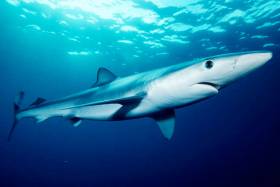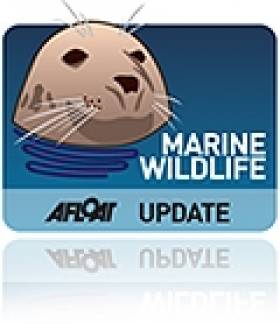Displaying items by tag: Blue Shark
Shark Bite Sea Angler Is Already Back Fishing
#Angling - A Belfast angler bitten by a blue shark at the weekend resumed his sea fishing trip within days of the incident, as the Belfast Telegraph reports.
Robert Malcolmson was rushed to the mainland by Crosshaven RNLI last Saturday evening (1 September) after he was bitten on the arm by the shark he and his friends were landing on the deep sea angling boat Deora De off Roches Point at Cork Harbour.
The 40-year-old lost a lot of blood from the four-inch wound on his arm — but after treatment at Cork University Hospital, he was back out at sea by Monday.
The Belfast Telegraph has more on the story HERE.
Shark Attack in English Channel Captured on Video
#SHARK ATTACK - The UK Sun has posted a dramatic video of the moment when two anglers in the English Channel were attacked by sharks.
Graeme Pullen and Wayne Comben had been fishing for Mako sharks to tag and release off Falmouth in Cornwall, as part of a marine wildlife conservation programme, when their 17-foot boat was suddenly surrounded by a school of blue sharks.
The three sharks were described by Pullen as being in a "frenzied state" during the three-minute assault.
“Normally they would hold back and wait to see if there was any food drifting free but these were very aggressive and just charged directly at the boat," he said.
“One of them came out of the water and launched an all-out attack on the bag of fish, biting and tearing it to pieces — it was very worrying to witness."
Pullen concurred with experts' belief that such sharks are coming closer to land to hunt as overfishing in the Atlantic has all but wiped out their food supply.
Shark 'Attack' of a Different Kind in Cork Harbour
#ANGLING - Known as the 'wolves of the sea', blue sharks haven't yet been showing in numbers off Cork Harbour, but a number of them surprised a group of anglers recently.
Donie Geary of the angling boat John Boy tells Cork Harbour Angling Hub that he was taking out a group of UK anglers in an area north of the Ling Rocks in a calm Saturday morning.
The boat put out a shark trace using mackerel, bran and fish oil as bait, but as Geary says, he wasn't optimistic about their chances, especially with the low numbers of mackerel.
Meanwhile, the group enjoyed a morning and afternoon of bountiful bottom fishing, forgetting about the shark rods, when "one of the ratchets screamed off".
That one was a false start, Geary explains, but the next one was hooked - and after "about 30 minutes of gentle coaxing on 30lb braid" they landed an impressive 60lb blue.
A few more scraps with the marine predators later and an even bigger 80lb specimen was landed and photographed before release.
Here's hoping this 'shark attack' is a good omen for more blues in Cork coastal waters this year.
Cork Harbour Angling Hub has more on the story HERE.































































